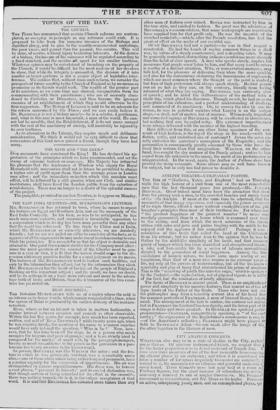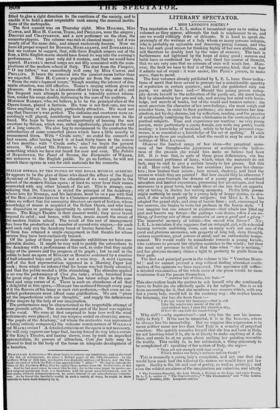CITY AMATEUR CONCERTS.
WHATEVER else may be in a state of decline in the City, certain music thrives. Of amateur instrumental talent, we suspect that far ilw larger proportion is to he found eastward of Temple Bar. V have seen three members of one cf the first mercantile houses occult ing efficient places in an orchestra ; and when it is considered Int large a number of foreigners (especially Germans) are constantly .1, tracted to it, the materials for an effective and powerful orchestra a; easiiy found. These Concerts were last year held at a room nq Finsbury Square, but the great increase of subscribers has render necessary a removal to one of ampler dimensions. Mr. FoRnes f announced as the conductor, and Mr. Mom as the leader. FORBES; an active, enterprising young man, and an accomplished player, qu fitted to give a right direction to the exertions of the society, and to- enable it to hold a most respectable rank among the musical institu- tions of the metropolis. The first concert was on Thursday night. Miss HUGHES, Miss CAWSE, and Miss H. CAWSE,TORRI, and PHILLIPS, were the singers ; DROUET and CHATTERTON, and a new performer on the oboe, the concerto-players. The scheme was rich in classical music ; but it was nearly all of the same date, and almost exclusively foreign. Now we have all proper respect for ROSSINI, MERCADANTE, and ZINGARELLI ; but we venture to suggest, that, with three English singers out of the
four, a little English music should have found its way into the evening's
performance. One piece only did it contain, and that we could have spared. HANDEL'S sacred songs are not fitly associated with the com- positions of the modem school of Italy. The duet from the Vampire, " 0 my father," was exceedingly well sung by Miss CAWSE and PHILLIPS. It bears the removal into the concert-room better than we expected. Miss H. CAWSE'S popular air from the same opera, " From the ruin's topmost tower," though wanting the interest of dra- matic situation, was still effective. TORRI'S singing seldom gives us
pleasure. It seems to be a laborious effort to him to sing at all ; and his frequent vain attempts to preserve a tolerably correct intona- tion, render his songs doubly distressing to the ears of his auditors. A
Monsieur BARRET, who, we believe, is to he the principal oboe at the
Opera-house, played a fantasia. His tone is not first-rate, nor was there anything in his playing particularly attractive. We need not
say that DROUET'S was perfect. The sinfonias and overtures were ex-
ceedingly well played, considering how many amateurs were in the band. We hope to have another opportunity of hearing the new
overture by SPOHR, which was, rather injudiciously, placed at the end
of a long concert. We also beg to recommend to the conductor the introduction of some concerted pieces which have a little novelty to recommend them. With " Cruda sorte," we ended the concerts of last season, after having heard it at least thirty times in the course of two months : with " Cruda sorte," alas ! we begin the present
season. We exhort Mr. FORBES to earn the credit of producing something which we have not heard for ever and ever. The Fidelio Of BEETHOVEN, the Faust of Scotia, the Euryanthe Of WEBER, are unknown to the English public. To go no further, he will not search these operas in vain for rich materials for his concerts.



















 Previous page
Previous page